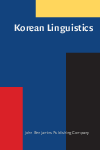
Korean Linguistics
metrics 2024
Fostering Dialogue in Korean Language Research
Introduction
Korean Linguistics is a premier scholarly journal dedicated to the exploration and advancement of the field of linguistics, with a specific focus on the Korean language and its various dimensions. Published by John Benjamins Publishing Co., this journal is a vital resource for researchers, linguists, and students seeking to deepen their understanding of Korean linguistics and its contextual significance. With an ISSN of 0257-3784 and an E-ISSN of 2212-9731, Korean Linguistics has gained recognition for its rigorous peer-reviewed articles and contributions to the academic community, evidenced by its current ranking in the third quartile (Q3) of the Linguistics and Language category. The journal aims to foster scholarly dialogue and disseminate innovative research methodologies, theoretical advancements, and empirical studies spanning from 2022 to 2024. Although it does not operate under an open access model, its impact on the understanding of Korean linguistics remains significant, making it an essential publication for anyone keen to engage with contemporary issues and developments in this specialized field.
Metrics 2024
 0.13
0.13 0.40
0.40 0.60
0.60 2
2Metrics History
Rank 2024
Scopus
JCI (Web Of Science)
Quartile History
Similar Journals
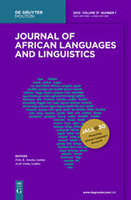
Journal of African Languages and Linguistics
Innovating the Study of African Languages and LinguisticsThe Journal of African Languages and Linguistics, published by DE GRUYTER MOUTON, is a premier academic journal dedicated to the study and analysis of the diverse languages spoken across Africa. With an ISSN of 0167-6164 and an E-ISSN of 1613-3811, this journal has been pivotal since its inception in 1979, engaging readers with rigorous research and scholarly articles that span across critical themes in linguistics and language studies. Based in Germany, the journal holds a distinguished Q2 category ranking in the field of Linguistics and Language, according to the latest 2023 metrics, and features a commendable Scopus ranking, positioning it well within the 56th and 52nd percentiles in its respective categories. Although it currently does not provide open access, it is an essential resource for researchers, professionals, and students alike, striving to deepen their understanding of African languages, their structures, and their sociocultural contexts. With a continuously expanding scope and a commitment to advancing linguistic scholarship, the journal remains a significant platform for fostering academic dialogue and promoting innovative research in African linguistics.
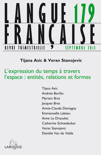
LANGUE FRANCAISE
Pioneering Research in French Language StudiesLANGUE FRANCAISE, published by LAROUSSE, stands as a premier journal in the realm of linguistics and language studies, boasting an impressive Q1 quartile rating in the 2023 Linguistics and Language category. With its international reputation anchored in France, this journal presents critical research and discussions that advance our understanding of the French language, its structures, usage, and evolution. Although not an open-access publication, LANGUE FRANCAISE is indexed with an ISSN of 0023-8368 and an E-ISSN of 1957-7982, reflecting its scholarly credibility and impact, including Scopus rankings that place it competitively in the fields of arts and humanities as well as social sciences. This journal serves as an essential resource for researchers, practitioners, and students aiming to deepen their knowledge and engage in scholarly debates that shape contemporary linguistic thought. The journal's commitment to high-quality research continues to foster an enriching academic environment and contribute to the dynamic discourse surrounding language and linguistics.

Taiwan Journal of Linguistics
Illuminating the Path of Language Acquisition and SociolinguisticsTaiwan Journal of Linguistics, published by CRANE PUBL CO, is a prominent Open Access journal dedicated to the field of linguistics since its inception in 2003. With its ISSN 1729-4649 and E-ISSN 1994-2559, this journal serves as a vital platform for the dissemination of significant research and scholarly discussions from Taiwan and beyond. The journal particularly focuses on advancing knowledge in linguistic theory, language acquisition, phonetics, and sociolinguistics, catering to a diverse academic audience including researchers, professionals, and students. Although it currently holds a Q4 ranking in the Linguistics and Language category, the journal's commitment to quality and accessibility positions it as an emerging resource for those engaged in language studies. Currently ranked #584 in Arts and Humanities and #668 in Social Sciences, it provides critical insights and fosters scholarly exchanges that enhance understanding within the field. The journal's open access model ensures the broadest reach for its published articles, facilitating the global sharing of linguistic research. For more information, visit the journal’s website to explore its latest publications and submission guidelines.

Journal of the International Network for Korean Language and Culture
Illuminating the Nuances of Korean Language and CultureJournal of the International Network for Korean Language and Culture is a prestigious academic journal dedicated to the study and dissemination of research pertaining to the Korean language and its rich cultural heritage. Published by the International Network for Korean Language and Culture, this journal serves as a vital platform for scholars, educators, and practitioners in the fields of linguistics, cultural studies, and education. As an open-access publication, it aims to make research widely accessible, fostering an environment of knowledge sharing and interdisciplinary collaboration. The journal features high-quality articles that contribute to our understanding of the linguistic intricacies and cultural nuances of Korea, and it is committed to advancing scholarly dialogue and exploration within this vibrant field. By highlighting current trends and advancements, the Journal of the International Network for Korean Language and Culture stands out as an essential resource for those engaged in the pursuit of knowledge about Korean language and culture.
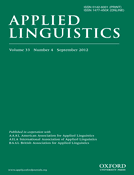
APPLIED LINGUISTICS
Connecting Scholars Through Language and CommunicationApplied Linguistics, published by Oxford University Press, is a premier scholarly journal that has significantly contributed to the fields of linguistics and communication since its inception in 1980. With an impressive impact factor and ranked in the top quartile (Q1) in both Communication and Linguistics and Language categories, Applied Linguistics is recognized for its rigorous peer-reviewed articles that explore the intersections of language, society, and cognition. The journal enjoys a remarkable position in the Scopus rankings, placing it among the top 2% of publications in its discipline. Researchers, professionals, and students benefit from its comprehensive scope, which encompasses innovative research on language acquisition, discourse analysis, and applied linguistics methodologies. Although not an open access journal, its commitment to advancing knowledge and fostering academic discussions makes it an indispensable resource for anyone interested in the critical role of language in various contexts.
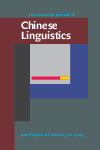
International Journal of Chinese Linguistics
Advancing Knowledge in Chinese Language StudiesInternational Journal of Chinese Linguistics is a distinguished publication that delves into various aspects of linguistic studies pertaining to the Chinese language. Published by John Benjamins Publishing Co, this journal stands out for its commitment to advancing the knowledge and understanding of Chinese linguistics within the global academic community. With an impact factor that places it in the Q2 quartile of linguistics and language, the journal is indexed in prominent databases, achieving ranks of #501 in Arts and Humanities and #580 in Social Sciences. These rankings reflect the journal's dedication to maintaining high scholarly standards and its relevance in both linguistic research and practical applications. While not categorized as Open Access, the journal provides necessary access through institutional subscriptions, thereby ensuring that valuable research reaches a broad audience. Covering a wide range of topics from syntax and phonetics to sociolinguistics and applied linguistics, the International Journal of Chinese Linguistics serves as an essential resource for researchers, professionals, and students seeking to deepen their understanding of the intricate relationship between language and culture in the Chinese context. With converging years from 2019 to 2024, it continues to evolve, reflecting ongoing developments in the field.

Suvremena Lingvistika
Fostering Innovation in Linguistics and Language Studies.Suvremena Lingvistika is a distinguished open-access journal published by the Croatian Philological Society, dedicated to advancing research in the field of linguistics and language. Since its establishment, the journal has been pivotal in promoting scholarly dialogue within the linguistics community, especially among researchers and academics in Croatia and beyond. With an ISSN of 0586-0296 and an E-ISSN of 1847-117X, the journal has transitioned to an open-access model since 2007, ensuring that research is freely accessible to all. As of 2023, it holds a respectable Q3 ranking in the Linguistics and Language category, reflecting its potential contribution to the field. The journal's scope encompasses a wide array of linguistic disciplines, encouraging both theoretical and empirical studies. Supportive of new research, Suvremena Lingvistika aims to foster innovative approaches and methodologies in linguistics, making it an essential resource for students, researchers, and professionals eager to explore the complexities of language. With its ongoing publication until 2024, it continues to shape the linguistic landscape, providing valuable insights and fostering collaboration among scholars globally.

Language and Linguistics Compass
Exploring the Frontiers of Linguistic KnowledgeLanguage and Linguistics Compass, published by Wiley, stands as a premier journal in the field of linguistics, showcasing innovative and interdisciplinary research. With its ISSN 1749-818X and E-ISSN matching, the journal has built a robust reputation, achieving an impressive Q1 ranking within the linguistics category for 2023, placing it in the top 4% of its field. Its Scopus rank of 48 out of 1167 highlights its influence and significance among linguistics journals, boasting a commendable 95th percentile. This journal serves as a vital resource for researchers, professionals, and students, offering a wide range of accessible articles that illuminate current trends and advances within the domain of language studies. Although it is not Open Access, the journal is committed to quality and diversity in its publications, ensuring scholarly articles from various sub-disciplines of linguistics are represented from 2008 through 2024. Located in the United Kingdom, Language and Linguistics Compass invites contributions from around the globe, reinforcing its status as a leading forum for linguistic discourse.

Heritage Language Journal
Connecting Communities through Language ResearchThe Heritage Language Journal is an esteemed publication dedicated to the field of heritage language studies, providing a platform for advanced research and discussions surrounding bilingualism, language maintenance, and cultural identity. Published by BRILL, a recognized leader in academic publishing, this journal aims to bridge the gap between theory and practice, offering insightful articles, empirical studies, and critical reviews that advance understanding of how heritage languages influence personal and community identity. With an ISSN of 1550-7076, the journal serves as an essential resource for researchers, professionals, and students engaged in linguistics, sociolinguistics, and multicultural studies. Although currently not an open-access journal, it maintains rigorous academic standards and is committed to fostering an inclusive dialogue on heritage languages worldwide. Additionally, by contributing to the ongoing discourse in this vital area of study, the Heritage Language Journal plays a significant role in preserving linguistic diversity and cultural heritage.

Annual Review of Linguistics
Advancing Linguistic Insights for a Deeper UnderstandingAnnual Review of Linguistics is a premier scholarly journal dedicated to advancing the field of linguistics through comprehensive and insightful reviews of current research and emerging trends. Published by ANNUAL REVIEWS, this journal is recognized for its high impact, evidenced by its Q1 ranking in the Linguistics and Language category and exceptional placements in the Scopus Ranks, positioning it in the top 2% of its field. Since its inception in 2015, the journal has served as a vital resource for researchers, professionals, and students seeking to deepen their understanding of language theories, acquisition, processing, and sociolinguistics. With no Open Access currently available, the Annual Review of Linguistics is esteemed for its rigorous peer-reviewed articles that synthesize a wealth of knowledge, making it an indispensable tool for advancing research and dialogue within the linguistic community.